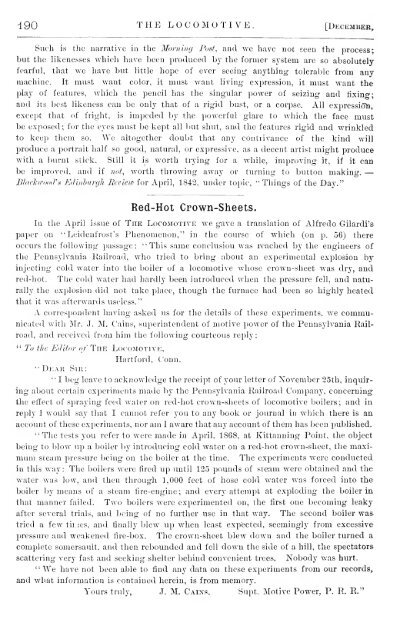The Locomotive - Lighthouse Survival Blog
The Locomotive - Lighthouse Survival Blog
The Locomotive - Lighthouse Survival Blog
You also want an ePaper? Increase the reach of your titles
YUMPU automatically turns print PDFs into web optimized ePapers that Google loves.
190 THE LOCOMOTIVE. [December,<br />
Such is the narrative in the Morning Post, and we have not seen the process;<br />
but the likenesses which have been produced by the former system are so absolutely<br />
fearful, that we have but little hope of ever seeing anything tolerable from any<br />
machine. It must want color, it must want living expression, it must want the<br />
play of features, which the pencil has the singular power of seizing and fixing;,<br />
and its best likeness can be only that of a rigid bust, or a corpse. All expression,<br />
except that of fright, is impeded by the jjowerful glare to which the face must<br />
be exposed; for the eyes must be kept all but shut, and the features rigid and wrinkled<br />
to keep them so. We altogether doubt that any contrivance of the kind will<br />
produce a portrait half so good, natural, or expressive, as a decent artist might produce<br />
with a burnt stick. Still it is worth trying for a while, improving it, if it can<br />
be improved, and if not, worth throwing away or turning to button making. —<br />
BlachwoocVs Edinburgh Review for April, 1842, under topic, "Things of the Day."<br />
Red-Hot Crown-Sheets.<br />
In the April issue of <strong>The</strong> <strong>Locomotive</strong> we gave a translation of Alfredo Gilardi's-<br />
paper on "Leideufrost's Phenomenon,'' in the course of which (on p. 56) there<br />
occurs the following passage: " This same conclusion was reached by the engineers of<br />
the Pennsylvania Railroad, who tried to bring about an experimental explosion by<br />
injecting cold water into the boiler of a locomotive whose crown-sheet was dry, and<br />
red-hot. <strong>The</strong> cold water had hardly been introduced when the pressure fell, and natu-<br />
rally the explosion did not take place, though the furnace had been so highly heated<br />
that it was afterwards useless."<br />
A correspondent having asked us for the details of these experiments, we commu-<br />
nicated with Mr. J. M. Cains, superintendent of motive power of the Pennsylvania Rail-<br />
road, and received from him the following courteous reply<br />
" To the Editor of <strong>The</strong> <strong>Locomotive</strong>,<br />
"Dear Sir:<br />
Hartford, Conn.<br />
" I beg leave to acknowledge the receipt of your letter of November 25th, inquir-<br />
ing about certain ex^^erimeuts made by the Pennsylvania Railroad Company, concerning<br />
the effect of spraying feed water on red-hot crown-sheets of locomotive boilers; and in<br />
reply I would say that I cannot refer you to any book or journal in which there is an<br />
account of these experiments, nor am I aware that any account of them has been published.<br />
"<strong>The</strong> tests you refer to were made in Aj^ril, 1868, at Kittauniug Point, the object<br />
being to blow up a boiler by introducing cold water on a red-hot crown-sheet, the maximum<br />
steam pressure being on the boiler at the time. <strong>The</strong> experiments were conducted<br />
in this way: <strong>The</strong> boilers were fired up until 125 pounds of steam were obtained and the<br />
water was low, and then through 1,000 feet of hose cold water was forced into the<br />
boiler by means of a steam fire-engine ; and every attempt at exjjloding the boiler in<br />
that manner failed. Two boilers were experimented on, the first one becoming leaky<br />
after several trials, and being of no further use in that way. <strong>The</strong> second boiler was-<br />
tried a few tiiaes, and finally blew up when least expected, seemingly from excessive<br />
pressure and weakened fire-box. <strong>The</strong> crown-sheet blew down and the boiler turned a<br />
complete somersault, and then rebounded and fell down the side of a hill, the spectator*<br />
scattering very fast and seeking shelter behind convenient trees. Nobody was hurt.<br />
"We have not been able to find any data on these experiments from our records^<br />
and what information is contained herein, is from memory.<br />
Yours truly, J. M. Cains, Supt. Motive Power, P. R. R."<br />
:
















